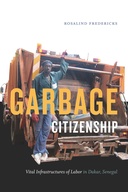Explore

Over the last twenty-five years, garbage infrastructure in Dakar, Senegal, has taken center stage in the struggles over government, the value of labor, and the dignity of the working poor. Through strikes and public dumping, Dakar's streets have been periodically inundated with household garbage as the city's trash collectors and ordinary residents protest urban austerity. Often drawing on discourses of Islamic piety, garbage activists have provided a powerful language to critique a neoliberal mode of governing-through-disposability and assert rights to fair labor. In Garbage Citizenship Rosalind Fredericks traces Dakar's volatile trash politics to recalibrate how we understand urban infrastructure by emphasizing its material, social, and affective elements. She shows how labor is a key component of infrastructural systems and how Dakar's residents use infrastructures as a vital tool for forging collective identities and mobilizing political action. Fleshing out the materiality of trash and degraded labor, Fredericks illuminates the myriad ways waste can be a potent tool of urban control and rebellion.
This book is included in DOAB.
Why read this book? Have your say.
You must be logged in to comment.
Rights Information
Are you the author or publisher of this work? If so, you can claim it as yours by registering as an Unglue.it rights holder.Downloads
This work has been downloaded 20 times via unglue.it ebook links.
- 20 - pdf (CC BY) at Unglue.it.
Keywords
- Social groups
- Society & culture: general
- Society & Social Sciences
- urban communities
Links
DOI: 10.1353/book.65103Editions

